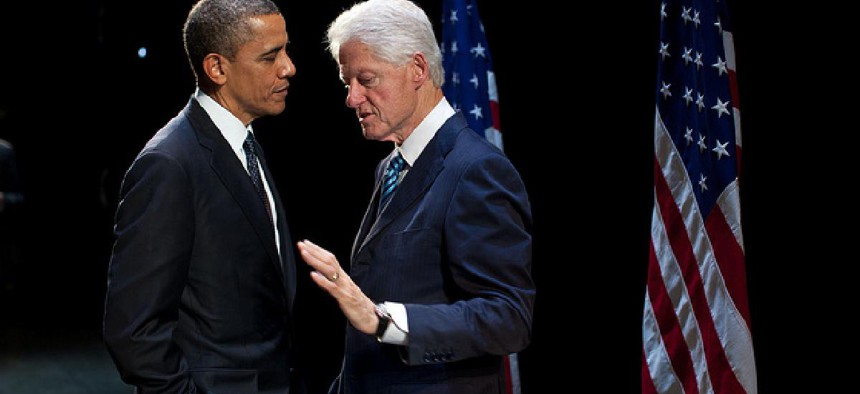
President Barack Obama talks with former President Bill Clinton backstage at the New Amsterdam Theater in New York, N.Y., June 4, 2012. (Official White House Photo by Pete Souza)
Tips for Surviving Email Crises From Clinton's 'Masters of Disaster'
A how-to brought to you by the guys who defended Bill Clinton on impeachment.
Your boss is an ass. You know it, your pal knows it, and now your entire company knows what you think of the Big Guy, including the jerk himself, because you just sent an angry missive -- totally and horrifyingly -- "Reply-All." What do you do?
Call the "Masters of Disaster," Chris Lehane and Mark Fabiani. Two political consultants who helped Bill Clinton survive Whitewater, the Monica Lewinsky scandal, and impeachment have written a book to help politicians, CEOs, and the average reader weather crises.
"Crisis is a constant state of nature in our Information Age. And in the modern spin cycle, whether you are a business protecting a brand, a public figure guarding your image, or that guy in the cubicle defending your reputation, if you do not fight back -- even after a short, nasty, or brutish experience -- you will no longer have your brand, your image, or your reputation," write Lehane and Fabiani in a book that borrows the nickname they earned defending Clinton, Masters of Disaster: The Ten Commandments of Damage Control.
Disclosure: I covered the Clinton White House and frequently dealt with both Lehane and Fabiani. While we had our share of tussles, I benefited from their strategy to selectively leak information, at times damaging to Clinton. The tactic gave them some measure of control over the story (when it would break and what reporter would cover it) and, according to their book, generated for their client the single most important commodity in a crisis: trust.
"In the Information Age, knowledge is power. In a crisis, when it comes to earning credibility, accurate information is the coin of the realm," they write. "Short of releasing information that could generate the equivalent of a death penalty for your organization (in which case, you are probably well beyond help), no matter how bad the information may be, packaging and releasing such negative information is among the most powerful ways to restore trust."
In a telephone interview, Lehane acknowledged the irony of two scandal-hardened operatives preaching trust. "We are in an age where there are huge trust issues with all institutions. That is ultimately what is at the heart of the crisis. People are challenging your credibility. You have to recognize it. You have to face up to it. You're not going to spin your way out of it," he said.
The book is filled with case studies, including some handled by Lehane and Fabiani for political and corporate clients (they run a California-based crisis-management firm). Two of the examples illustrate the right and wrong way to respond to an agonizing reply-all gaffe.
Wrong: In 2001, Peter Chung, a young, Ivy League-educated aspiring "Master of the Universe" sent an e-mail to friends bragging that "CHUNG is King of his domain." It offered salacious details of his wild ways. "Once his e-mail went viral," the authors wrote, "his tenure at Carlyle was extremely short-lived."
Right: At a prestigious law firm recently, summer associate Jonas Blank accidentally hit reply-all in an email describing his boredom and laziness on the job. He went into damage control within two minutes, firing off a second reply-all email that explained his mistake and apologized. Blank wrote that he recognized the damage he had done to the law firm and was concern with "the implicit reflection such behavior could have on the firm."
His e-mails went viral, but the coverage differed from Chung's Bonfire of the Vanities treatment. Blank's miscue was called a "teachable moment" for summer associates, and Blank was reportedly invited back and hired by the firm after he graduated from law school.
Lehane, Fabiani and coauthor Bill Guttentag (a two-time Oscar-winning documentary and feature film producer) said that Blank's response was textbook:
- "He fully disclosed this mistake and put out the story first and on his terms."
- "He got in front of the story by telling the whole story."
- "He put himself in a position to take responsibility and earned credibility for doing so, and this allowed him to rebuild trust."
"Just imagine if there had not been an immediate response," they wrote. "The subsequent story would have been far worse -- in the Peter Chung category -- and the lawyer would have been escorted from the building, never to be invited back."
(RELATED: In a Crisis Be Like Eliot Spitzer, Not Anthony Weiner)
In the interview, Lehane acknowledged that Clinton broke many of the book's commandments, especially involving transparency. Then again, he said, Hank Aaron batted cross-handed and is in the Hall of Fame. "I'm not sure that most people have the skills and talent" that Clinton had to survive mistakes in crisis.
One of his corporate clients, the National Hockey League, is a case study in the book for its smooth handling of the 2004 players' lockout. Lehane, who no longer represents the NHL, demurred when asked about the lockout that threatens this season.
"They handled it exactly right the first time," he said. "I don't want to disparage the NHL, but if you want to make a comparison, Godspeed."
NEXT STORY: A Year in Search: Google’s 2012 Year in Review







